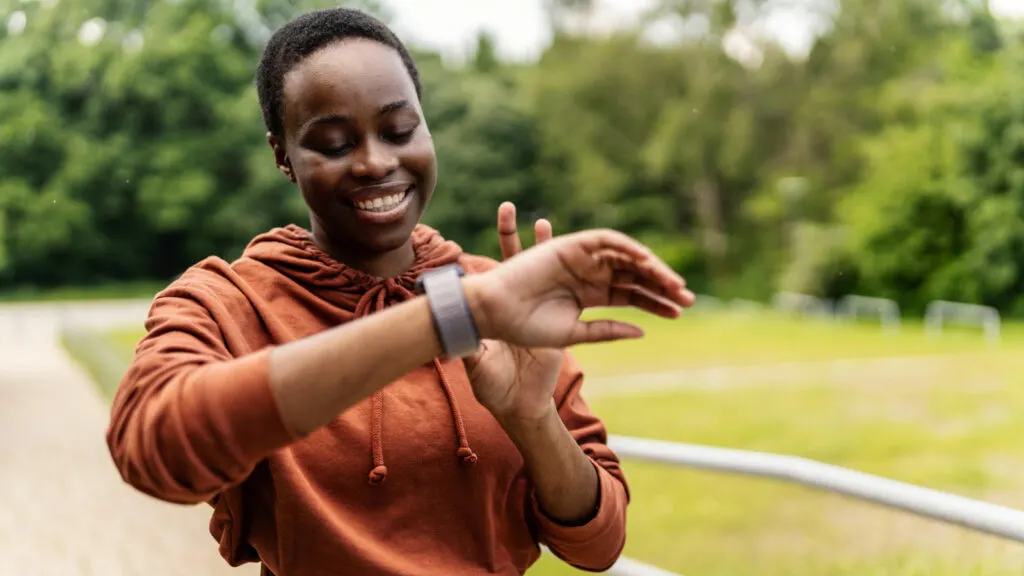Want some feel-good vibes – try taking a daily walk! Fresh air can clear your head of negative thoughts and top up your vitamin D levels – even on a cloudy day. But what happens to your body when you walk every day? Does regular walking help you get fitter and will you lose weight?
Walking just one mile a day can have huge benefits for your overall health. The Centers For Disease Control And Prevention (CDC) recommends 150 minutes per week of moderate-intensity aerobic activity and brisk walking is the easiest way to hit this target. All you need to do is walk for just over 20 minutes daily.

A daily walk is ideal if you want a low-impact accessible form of exercise. With a good pair of walking shoes or trainers and some comfortable non-restrictive clothing, you’re ready to go. You can access a regular walking routine right from your front door.
Here are some of the amazing health benefits of a daily walk:
#1 Walking Makes You Fitter
A brisk walk is a simple way to elevate your heart rate, increase blood flow, and improve your cardio. Studies have shown that walking 30 minutes a day protects against heart disease, reduces high blood pressure, and lowers blood sugar levels – you can reduce the risk of type II diabetes.
With just half an hour of daily walking, you’ll quickly notice how much better you feel. You’ll soon be racing upstairs instead of taking the lift!

#2 Weight Maintenance Is Easier
Anyone who tells you exercise is a waste of time when you’re trying to lose weight doesn’t understand the process.
It’s true weight loss mainly depends on what you eat. But when it comes to diet vs exercise, diet may help you reach a healthy weight but it’s exercise that keeps the weight off.
When you diet but neglect exercising, your body will indiscriminately burn through body fat and muscle. This reduced muscle mass will slow down your metabolism making it hard to maintain your new weight without constantly dieting.
That’s the reason most diets fail and the US weight loss market is worth 135 billion dollars – there’s a lot of repeat business!

#3 It Can Help You Lose Weight
Healthy eating and avoiding processed foods is the easiest way to lose weight but regular exercise helps to build a calorie deficit.
If you’re aiming for a 500-calorie deficit a day, it’s a lot easier to hit that target if some of the deficit comes from exercise. Every mile you walk burns approximately 80 to 100 calories. With our calories burned walking calculator you can adjust for body weight and walking speed.
Here are some ideas for increasing the calorie burn:
- Walk faster: Time yourself on a favorite route and try to beat your best time. More advanced walkers can experiment with walking intervals.
- Try incline walking: Walking uphill rapidly increases your calorie burn.
- Walk with weights: Carrying a pack or using a weight vest can be a good way to increase calorie burn.
- Up the distance: The further you walk the more calories you’ll burn. Try walking for longer one or two days a week.
Need more ideas? Follow our walking workouts or try these tips to get more steps in a day!

#4 It’s Good For Your Mental Health
If I miss my daily exercise, I feel restless and struggle to sleep at night. Just a short walk makes a huge difference.
Walking isn’t just good for your heart health, the mental health benefits are equally important. Physical activity in the fresh air is a big mood lifter. It can help with anxiety and even provide respite for long-term conditions.
Adding a walk to your daily routine can reduce stress, improve your mood, and boost your overall sense of well-being. Plus, it’s a great way to clear your mind and get some much-needed alone time.
#5 Your Bones And Muscles Will Be Stronger
Keeping your bones and muscles strong and improving your balance will help you avoid mobility issues as you age. Brisk walking at a fast pace can help to achieve this.
The impact of walking can reduce the risk of osteoporosis. It will keep your leg muscles strong and helps with balance. Combine your walks with bodyweight exercises, such as squats and lunges, for a full-body workout.
After your walk, keep your fitness on track with what to eat after walking to lose weight.


